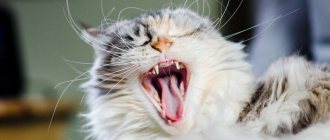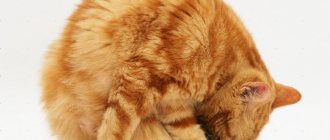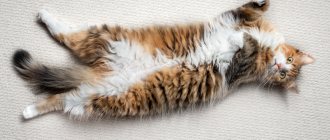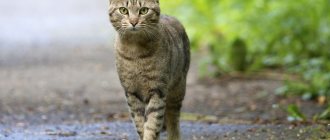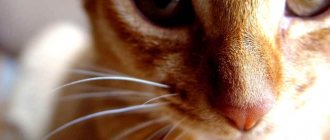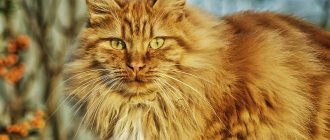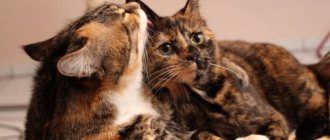Yawning is a common involuntary behavior. Scientists have not yet figured out the exact reason why cats yawn, despite how common it is. Some theories as to why your cat yawns when he sees you are worth considering.
The cat will yawn when it sees you because it feels content and comfortable. This is a way to show that your pet is completely relaxed in your presence. Yawning is your cat's way of getting more oxygen and waking up as she wants to regain her energy and is ready to spend time with you. Of course, some cats just want to sleep.
Some experts suggest that cats yawn as a unique form of communication. Yawning works like body language to get your attention, except for actual meowing. In most situations, an occasional yawn means that the cat is relaxed.
Your cat needs more air
Sometimes cats open their mouths wide and yawn to take deep breaths. This may indicate that your pet is having difficulty breathing.
If you notice that your cat is yawning a lot, it's probably a good idea to take her to the vet as soon as possible. While this may not be dangerous, it's worth being on the safe side just in case.
© shutterstock
Many people yawn when they stretch, which is completely normal. However, this is their way of getting more oxygen. This is usually not something you should worry about unless it is accompanied by some abnormal behavior.
Stressful situations
Under the influence of factors that frighten a cat, significant amounts of hormones are released into the blood, bringing the body into full readiness to fight difficulties. Such situations can often be observed when visiting a veterinarian, for example, or while traveling in a vehicle with an animal previously unfamiliar with open spaces.
In addition to yawning, cats sometimes begin to breathe with their mouths open, which does not occur under normal conditions. This indicates a special degree of stressful tension and enormous fear.
If possible, all necessary manipulations should be performed with maximum speed in order to minimize the total duration of the pet’s state of shock.
Boredom
Another explanation for a kitten yawning is that it is bored. Cats can get bored and anxious, just like their owners.
If you don't give your cat enough attention or play with him every day, boredom can quickly creep in. Almost all animals breathe deeply when they are stimulated in some way. If your pet doesn't get enough mental and physical stimulation, he may start yawning.
It's important to make sure your fuzzy friend gets the attention he deserves every day. You should take time to play with your cat, especially if it seems like she might be bored.
You may interpret this behavior as your cat trying to tell you that she needs to be entertained and that this is partly your responsibility.
The child yawns often - why?
The baby begins to yawn while still in the mother's womb at about the eleventh or twelfth week of pregnancy. Why do children yawn? One recent American study confirmed that yawning is evidence of the successful and correct development of a baby's lungs. However, at each age, the tasks of yawning are different, and if a yawn often helps adults to cheer up, then a baby, with the help of a yawn, regulates the temperature of the brain, calms down and falls asleep.
But if a child yawns too often and not when it is time for him to rest, it would be a good idea to consult a doctor, since yawning may indicate a lack of oxygen or nervous tension. In the second case, you will need to consult a neurologist, and if the problem is a lack of oxygen, then you will have to reconsider the baby’s regimen in the direction of increasing the duration and frequency of walks in the fresh air.
Discomfort
There is a chance that your cat is yawning due to some kind of discomfort. Some cats yawn if they experience pain, especially in the mouth. This could be anything from a toothache to a sore mouth.
If you notice that your cat is drooling excessively and yawning a lot, it's time to visit your veterinarian. It is very likely that something is wrong with them and needs to be sorted out.
You should also pay attention if your cat seems to be pawing at the mouth. This could very well mean that they are in pain for some reason. In this case, the cat may attack if you try to touch its mouth. These are all signs that something is wrong with them.
© shutterstock
Diagnostics
Determining the exact reason why a symptom occurs is not easy, so it is important to pay attention to other signs.
With a complaint of frequent yawning, they contact a therapist, who conducts an examination and, if necessary, sends the patient for tests (biochemistry of blood and urine, ultrasound of organs, testing for tumor markers - depending on the situation). Based on the results obtained, the doctor will be able to make a more accurate diagnosis and refer you to a highly specialized specialist for further treatment.
If you suspect that frequent yawning is psychogenic in nature, you should consult a psychotherapist. Here the study will be based on a conversation with a doctor and performing psychological tests. Additional tests may be required to make a more accurate diagnosis.
Your cat imitates you
There is a known phenomenon among people when one person yawns if he sees another doing it. The scientific term for this is “mirror neuron response.” Some researchers believe this could even happen between two different species.
This means that your cat may yawn simply because it notices you yawning. Next time you find yourself yawning in the same room as your kitten, take a quick look to see if they've copied you. It may seem far-fetched, but it's definitely not the strangest theory about cat yawning.
Reasons why a cat yawns
The reasons why a cat yawns can be very diverse. But they are caused either by physiological reasons or psychological.
Natural causes
Natural causes of yawning in cats include all physiological and behavioral processes that require rapid enrichment of the body with oxygen.
After waking up
During sleep, your cat's metabolism slows down. The work of all organs proceeds in an energy-saving mode. The animal's body is relaxed. Oxygen consumption is reduced. When an animal awakens, it must quickly prepare itself. Dispel the fogginess of perception, put the muscles in order, because relaxation is the first enemy of any animal, as it threatens trouble. Stretching and yawning help a cat quickly restore the functioning of all parts of the brain and the body as a whole. Stretching warms up stiff muscles, increases blood circulation, and yawning provides an influx of oxygen.
By yawning, a cat supplies the body with a large portion of oxygen, and stretching stimulates blood circulation in the muscles.
Before physical activity
Yawning before physical activity replaces the cat's warm-up. If a person warms up his muscles with a set of exercises, then a cat prepares itself by yawning.
Before going to bed
Everyone yawns before going to bed. Drowsiness occurs only when the entire body requires recharging in the form of sleep. Having exhausted all energy reserves, it must be restored by shutting down. But during sleep, all processes slow down very much, so by yawning the body increases the amount of oxygen that will be required to maintain the functioning of all systems. This process is identical for all living beings.
Yawning before bed will provide the body with an influx of oxygen, which is required for the operation of all systems while the cat sleeps
Video: everyone yawns
Stress
During stress, there is a sharp release of adrenaline into the blood, contraction of blood vessels throughout the body, and increased heart rate. Stress is caused by fear, aggression, pain. This process is also the same throughout the animal world. The breakdown products of chemicals entering the blood can cause intoxication of the body. In this case, yawning is a great help. By saturating the blood with oxygen, it helps rid the body of harmful impurities and improve the functioning of all sensory organs: vision, hearing, smell and touch. Stressed yawning is easily distinguishable, as it occurs against the background of unusual situations for the cat (for example, a visit to the veterinarian) and has a high repetition rate.
After meal
Nature dictates that spending a lot of time on the digestion process is detrimental to a cat. She cannot afford to lie quietly and wait for it to end. Of course, this does not apply to pets, but there is no escape from the reflex developed over millennia of evolution. Therefore, yawning helps the cat cope with digestion faster, again by saturating the blood with oxygen.
There is another reason why representatives of the cat world yawn. This is a demonstration of one’s leadership position at the hierarchical levels of the community. By yawning, a cat shows its superiority, in this process all its teeth are perfectly demonstrated.
Forced reasons
Forced causes of yawning include various pathological processes in the body, as well as the impact of meteorological phenomena.
Diseases
When a neurotic disease occurs, the cat often yawns. Moreover, the yawns are short, frequent, convulsive. As a rule, this symptom is not isolated. There is a group of signs:
- scratching;
- head tremor;
- frequent swallowing.
First of all, the veterinarian will suspect not just stress, the examination will be aimed at identifying a brain tumor. The fact is that the reason for yawning in this case is not a lack of oxygen, but the pressure of the tumor on certain areas of the brain and their irritation, which causes the yawning reflex.
By yawning, a cat partially relieves stress and pain.
Changes in atmospheric pressure
Cats, just like people, can be weather dependent. Changes in atmospheric pressure cause the same headaches as in humans. It has already been proven that some cats suffer from hypertension, which worsens when atmospheric pressure drops. Cats are more sensitive to this, so they react by yawning, trying to restore the blood supply to the body's cells with an influx of oxygen.
There is a popular belief: a cat yawns often - a sign of warm, clear weather.
Imitative reflex
Cats that have a strong bond with their owner are sensitive to the physical condition of a person. They are no strangers to responding to people's behavior. When someone nearby yawns, the interlocutor involuntarily begins to yawn too. So are cats. Being close to the owner, their reflex is triggered, and the cat yawns, imitating the owner.
How to get rid of yawning, recommendations
To stop your pet from yawning you need to:
1) Allow the animal to get enough sleep, that is, organize a daily routine.
2) Provide physical activity, namely, play more. The latter is easily achievable if you use special toys for cats , which allow you to use all muscle groups in the body of the mustachioed tabby.
3 Balance your diet. Food should be easily digestible
4) Try to reduce the number of stressful situations. If such problems occur, use special herbal preparations to relieve tension, fear, stress, allowing the four-legged animal to relax.
5) Be regularly examined by a veterinary specialist; in case of illness, carry out treatment measures in a timely manner.
What can I do to prevent this in the future?
If you are on a personal connection, like at home, you can run an anti-virus scan on your device to make sure it is not infected with malware.
If you are at an office or shared network, you can ask the network administrator to run a scan across the network looking for misconfigured or infected devices.
Another way to prevent getting this page in the future is to use Privacy Pass. You may need to download version 2.0 now from the Chrome Web Store.
Cloudflare Ray ID: 569a5b6edc8bc79d • Your IP: 5.45.65.94 • Performance & security by Cloudflare
As a Norwegian it makes me sad to see all these abandoned farms in Norway because I guess that's what this article is about.
One small note here is that all the pictures shown are about 20 photos of the same house, but from different angles and uncontrolled feeds. In addition, there are buildings presented here that were not intended for habitation at any time, but as barns or outbuildings, as we say, and often with a private workshop included in the outbuildings.
There are also images of what we call main houses or manors, large farms in which many of the countrymen participate as "housewives" - there are simply no such abandoned large estates in Norway. Therefore, the photographs must be taken from another country.
Some of the drawings show a boathouse (boat house) and are presented as an abandoned house. Secondly, there are photographs of houses that do not belong to any Norwegian building customs or structures and which obviously came from other countries.
